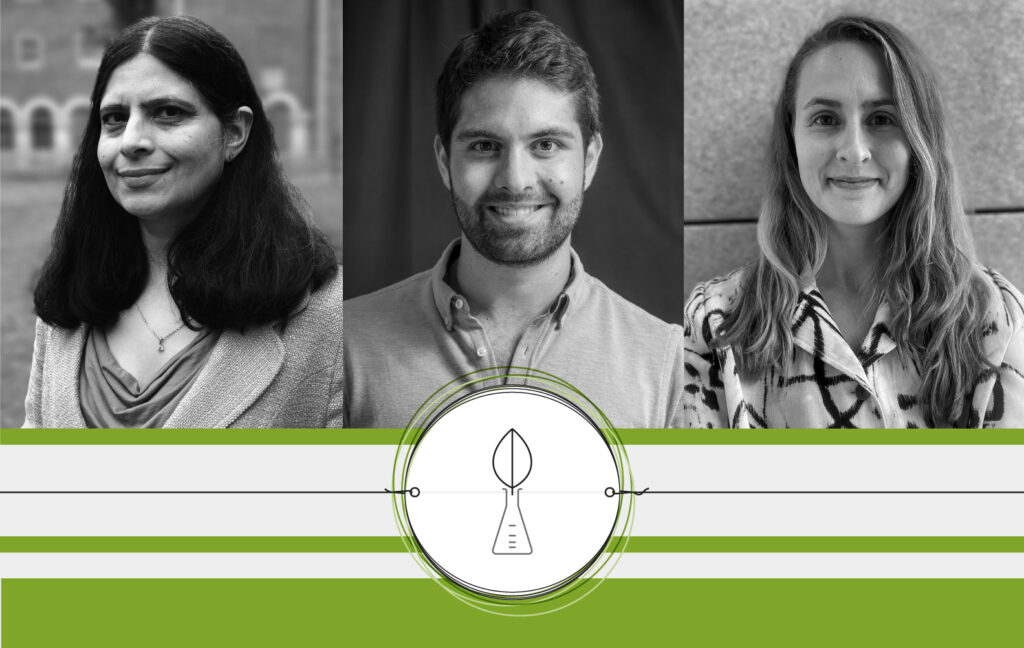12 November 2024 – Saroj Saurya, Loïc Lannelongue and Florijn Dekkers were three of the six shortlisted candidates for the EMBO Lab Sustainability Award. They talk about their inspiration and introduce their collaborative projects with their successes and challenges here.
Suffering sea-life
“When I watched the Blue Planet II series by David Attenborough and saw the devastating impact of plastic in the oceans, I knew I needed to make a change in the lab,” says Saroj Saurya of the Sir William Dunn School of Pathology, University of Oxford, UK. Like many others worldwide, she was inspired by the hugely successful series on marine life she watched in 2019. The COVID pandemic also provided an opportunity for reflection. Saurya recalls: “The pandemic has helped me to prioritize environmental sustainability, and I learned a lot about sustainable practices online.”
Saurya introduced protocols for washing and reusing plastic materials in the Raff lab, where she is the postdoctoral laboratory manager. She began with fruit fly embryo collection plates, which didn’t need to be sterile, and expanded the efforts to include fly vials, gloves, 50ml tubes, DNA prep columns, agar plates and protein collection tubes. These practices spread throughout the Dunn School; glove recycling boxes and centralized washing for 50ml tubes became the norm.
As current chair of the Dunn School Green Group, Saurya played an important role in advocating for greener practices. All labs have now received the LEAF Gold Award, an achievement that can enhance grant applications. The group also launched a monthly green award to encourage far-reaching involvement and led the impactful food rescue initiative: volunteers collect surplus food from supermarkets and redistribute it to those in need or within the Dunn School. Despite these success, ongoing challenges remain, particularly the time and costs associated with reusing lab plastics. Saurya notes: “Plastic is still too cheap to see lasting changes in the lab practices everywhere.”
Blazing bushfires
Like Saurya, Loïc Lannelongue was inspired to work on sustainability by seeing the impact humans have on nature. He witnessed it during video calls with his PhD supervisor and colleagues in Melbourne in early 2020, where one of the most catastrophic bushfires Australia had ever seen was raging. “The background was deep red smoke. They had to put adhesive tape and clingfilm on their windows to keep it out,” he says. “I knew about climate change, of course, but this hit a bit closer to home.” This experience, and a publication on the carbon footprint of natural language processing, prompted Lannelongue and the computational biology lab he worked in at the University of Cambridge, UK, to think about the carbon footprint of their research.
Keen for a change from his PhD project, Lannelongue took on what he thought would be a two-week project to estimate the footprint. But he quickly realized that there was no resource available to calculate it for computational research. He spent about a year developing an open source online calculator, which can be used for any field of research now. He is grateful for the support from his supervisor: “I just had the freedom to pursue the sustainability project, which was very fortunate. Most people have to do it in their spare time, which is completely unmanageable.”
Now a research associate, Lannelongue continues to balance his work on the Green Algorithms project with biomedical research. He is both working on a calculator for high performance computing, and, in his radiogenomics research, combining medical imaging with genetics and AI to understand cardiovascular diseases.
Feeling injustice
Florijn Dekkers had been a biomedical scientist for more than ten years when she started working on sustainability. She initially pursued it part-time, but soon found that all her energy was going into the initiatives. Today, she has several roles in accelerating the transition to sustainable healthcare and science as scientific coordinator of Circular Safe Hospitals and planetary health expert at the UMC Utrecht, the Netherlands. “It was quite a big decision, but it was the best thing that I’ve done,” she comments.
Together with others, Dekkers started the Green Labs NL foundation. Among its activities were rolling out LEAF in the country and organizing an event for funding agencies with the aim of sparking a green movement. Dekkers also has a role in education, which has become a major focus of Green Labs NL. The team has helped develop two e-learning modules, on general sustainable science practices and on sustainable laboratory research, and also brought together the education community to share insights and best practices.
Her motivation comes from a love of nature and realizing the injustice of her own research towards it. It included cloud storage of many terabytes of data and flying to conferences all over the world, which was in stark contrast to the sustainability measures Dekkers had implemented at home. Starting a family with two children and the burning question “What do I tell them later?” made her feel even more urgency. “Give people options and actions. Don’t stop after the urgency,” she says about convincing others. She also makes sure to explain benefits beyond sustainability— for example, that a data cleaning challenge can not only save energy, but also costs—to convey a positive feeling.



